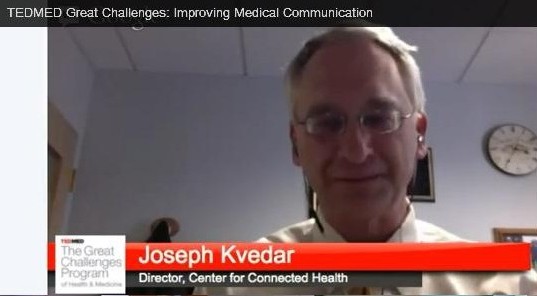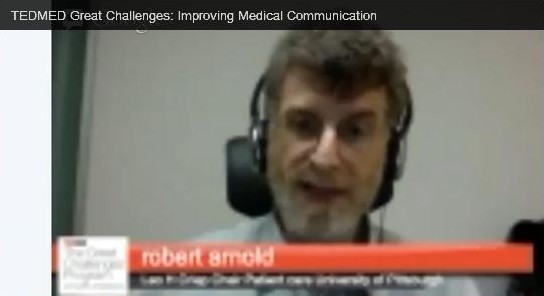By Barbara Ficarra, RN, BSN, MPA
Part three of a three-part series on Healthin30
TEDMED Great Challenges: Improving Medical Communication
This post on Healthin30 is part three of the three-part series on the TEDMED Great Challenges: Improving Medical Communication with Joseph Kvedar, MD and Robert Arnold, MD.
The TEDMED Great Challenges Team in Medical Communication recently gathered together on Google Plus Live Hangout to talk about how to improve medical communication in the health care today.
The medical communication team: Joseph Kvedar, MD, Robert Arnold, MD, Selma Caal, MD, John Cox, and Barbara Ficarra, RN, BSN, MPA was moderated by Emily Paulsen.
In part-one, I shared my thoughts on the topic of medical communication. I spoke about the importance of empathy, being an empowered patient, and the significance of verbal communication for physicians, clinicians and nurses. In part two, Selma Caal, MD and John Cox offered their expertise.
The YouTube video is here. Below, please find thoughts and insights from Joseph Kvedar, MD and Robert Arnold, MD, which are in tweetable form.
Joseph Kvedar, MD – Founder and Director, Center for Connected Health, Partners HealthCare
Sound bites from the conversation for Twitter
- Clinicians-View through the patients eyes …By @JKvedar Via @BarbaraFicarra @TEDMED #greatchallenges #hcsm
- …and communicate in a way which is clear, wait for questions By @JKvedar Via @BarbaraFicarra @TEDMED #greatchallenges #hcsm
- Clinicians be thoughtful and don’t hurry By @JKvedar Via @BarbaraFicarra @TEDMED #greatchallenges #hcsm
- Arm patients with good data and tools and meet them where they are. By @JKvedar Via @BarbaraFicarra @TEDMED #greatchallenges #hcsm
- Engaged patients more likely to have better outcomes By @JKvedar Via @BarbaraFicarra @TEDMED #greatchallenges #hcsm
- If things go sour patients less likely to hold you accountable if… By @JKvedar Via @BarbaraFicarra @TEDMED #greatchallenges #hcsm
- …patients are part of decision making process By @JKvedar Via @BarbaraFicarra @TEDMED #greatchallenges #hcsm
- Email to patients has to be very contextual -not for people I’ve never met before By @JKvedar Via @BarbaraFicarra @TEDMED #greatchallenges
- For my patients we email a lot By @JKvedar Via @BarbaraFicarra @TEDMED #greatchallenges
- When you have a good relationship with a patient it works quite well By @JKvedar Via @BarbaraFicarra @TEDMED #greatchallenges
- Sees about 20 patients in a half day—so every minute counts By @JKvedar Via @BarbaraFicarra @TEDMED #greatchallenges #hcsm
- As human beings we lost the ability to be present By @JKvedar Via @BarbaraFicarra @TEDMED #greatchallenges #hcsm
- Patients that are engaged do better By @JKvedar Via @BarbaraFicarra @TEDMED #greatchallenges #hcsm
- It’s their body and their life and I’m only there as a steward. By @JKvedar Via @BarbaraFicarra @TEDMED #greatchallenges #hcsm
- Some people don’t want shared decision making By @JKvedar Via @BarbaraFicarra @TEDMED #greatchallenges #hcsm
- Ask are there any other questions. In the beginning I say what can I do for you? By @JKvedar Via @BarbaraFicarra @TEDMED #greatchallenges
- And then patients feel they’ve been heard By @JKvedar Via @BarbaraFicarra @TEDMED #greatchallenges #hcsm
Robert Arnold, MD – Director, Institute for Doctor-Patient Communication, University of Pittsburgh School of Medicine
Sound bites from the conversation for Twitter
- Questions patients have “What’s wrong with me?” “What does it mean to my life?” and By Dr Arnold Via @ BarbaraFicarra @TEDMED #greatchallenges
- …“What can be done?” By Dr Arnold Via @ BarbaraFicarra @TEDMED #greatchallenges
- Important 2 empower patients but not blame people who are sick bc not empowered By Dr Arnold Via @BarbaraFicarra @TEDMED #greatchallenges
- Bottom line-patients aren’t going to know as much medicine as health care team By Dr Arnold Via @BarbaraFicarra @TEDMED #greatchallenges
- Patients job is to think about what’s most important to them By Dr Arnold Via @BarbaraFicarra @TEDMED #greatchallenges
- Structure visits-physical structure of the room helps with communication By Dr Arnold Via @BarbaraFicarra @TEDMED #greatchallenges
- Don’t have a computer blocking your view of the patient By Dr Arnold Via @BarbaraFicarra @TEDMED #greatchallenges
- When you talk to patients, say, “Here’s what the plan is…” By Dr Arnold Via @BarbaraFicarra @TEDMED #greatchallenges
- Important to explain to patients what comes next and explain things By Dr Arnold Via @BarbaraFicarra @TEDMED #greatchallenges
- Communication is a skill and it doesn’t’ come natural to anyone… By Dr Arnold Via @BarbaraFicarra @TEDMED #greatchallenges
- Otherwise there wouldn’t be row after row of relationship books in book stores By Dr Arnold Via @BarbaraFicarra @TEDMED #greatchallenges
- We think we communicate well, but data shows we have lots of problems. By Dr Arnold Via @BarbaraFicarra @TEDMED #greatchallenges
- HCPs need to have more emotional flexibility and mindfulness By Dr Arnold Via @BarbaraFicarra @TEDMED #greatchallenges
- Find out from 1st visit if patient wants to be part of decision making process By Dr Arnold Via @BarbaraFicarra @TEDMED #greatchallenges
- Some patients don’t want that. Negotiate upfront about style. By Dr Arnold Via @BarbaraFicarra @TEDMED #greatchallenges
- You’re not going to read my mind, and I’m not going to read yours. By Dr Arnold Via @BarbaraFicarra @TEDMED #greatchallenges
- Clinicians ask open ended questions… By Dr Arnold Via @BarbaraFicarra @TEDMED #greatchallenges
- and studies show patient responds in 2 or 2 1/2 minutes. By Dr Arnold Via @BarbaraFicarra @TEDMED #greatchallenges
- And ask what other questions do you have? By Dr Arnold Via @BarbaraFicarra @TEDMED #greatchallenges
- We can use the web and we can use old fashion talking By Dr Arnold Via @BarbaraFicarra @TEDMED #greatchallenges
Your turn
What Twitter sound bites do you have to improve medical communication in health care today? Please share them in the comment section below.
As always, thank you for your very valuable time.
More on TEDMED
TEDMED Great Challenges of Health and Medicine – Medical Communication
TEDMED Great Challenges: Improving Medical Communication-Sound Bites for Twitter
Part 2 – TEDMED Great Challenges: Improving Medical Communication-Sound Bites for Twitter
Connect with me | Stay in touch
- Follow Barbara on Twitter
- Visit Barbara Ficarra on Facebook
- Like Healthin30
- Connect with Barbara on Linkedin
- Become a Fan and Like Barbara Ficarra on The Huffington Post


